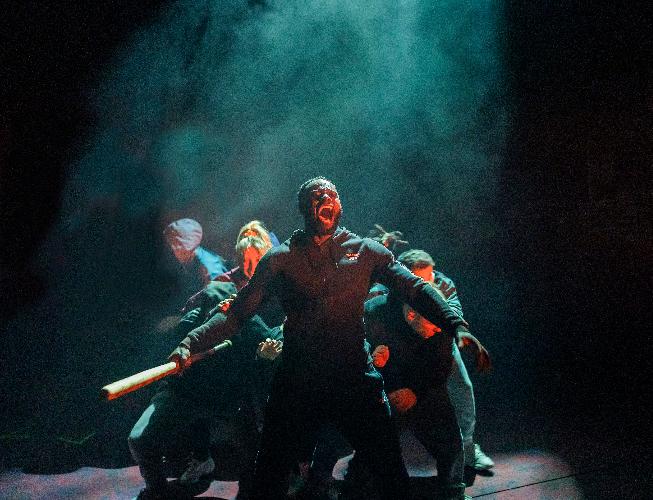Frantic Assembly’s revival of the 2008 production of their 2008 Othello is consistently relevant. Tipped as one of the greatest outreach productions for a younger audience, Scott Graham and Steven Hoggett’s adaption attempts to modernize Shakespeare’s tragedy with a contemporary approach.
When Othello returns from triumph in a mighty battle, in this case, a brawl with another gang in the local pub, his legendary feats in battle are rewarded with the affection and marriage of Desdemona. However, his snapback-brandishing best friend Iago becomes corrupt with jealousy and resolves to strip Othello of everything by manipulating everyone around him - namely his Lieutenant Cassio.
Michael Akinsulire’s Othello is a highly charged Moor. Aided by his physically powerful appearance, Akinsulire asserts his claim as the Moor with consistently exerted vocal energy. His relationship with Chanel Waddock’s Desdemona is sensitive at first but quickly becomes enfettered with raised tones and the chemistry falls away. Most of this is expressed through physical transitions from Scott Graham’s direction, Perry Johnson’s co-choreography, David Gilbert’s associate direction and most likely an ensemble collaboration across the board.
These transitions offer an opportunity to express the nature of the ‘lad culture’ amongst Othello and his entourage without being too crass. The aggressive conflict setting the scene is effective in drawing us into the world of the local boozer: drugs changing hands, couples running into private cubicles and spats of arguments dispersed amongst the constantly flowing alcohol.
Joe Layton’s devilish Iago is full of charm and snake-like quality as he spins a web around Othello to puppeteer his demise. Equally, Tom Gill’s Cassio is perfectly naïve as the prey caught within Layton’s trap. Gill hits the toxic male ego on the head as he is encouraged to drink and drink to no end just to fit in with the crowd. Layton’s chameleon-like transformations are addictive as he weaves Felipe Pacheco’s Rodriguez into the downfall of Cassio and Othello alike.
The climax, without too many detailed spoilers, is extremely graphic. The balletic movement of earlier transitions gives way to some gruesome special effects and stage combat. Whereas Desdemona’s death is perhaps one of the softest of Akinsulire’s actions, while the aggression unlocked in the ensemble is overtly shocking.
Kirsty Stuart’s Emilia plays a pivotal role as Iago’s wife and accomplice. Stuart’s penultimate speech is a highlight as she counsels Waddock in the grimy bar toilets of the destructive nature men have on their wives when left unchecked with patriarchal discrepancies. Similarly, Pacheco’s Rodriguez gifts us some light comic relief with his impressionable Bambi-like eagerness.
Laura Hopkins’ design is highly effective in complementing the ensemble assisting with smooth transitions and visually expressive action. Similarly Natasha Chivers’ original lighting design, with further design from Andy Purves for the 2014 production, effectively catapults us into the mundane local bar.
Graham and Hoggett’s revival is a fast-paced gateway to Shakespeare’s epic tale with plenty of excitement and malice to engage in particular a younger audience.
It runs until 11 February.
Review: Sebastian Calver Photo: Tristram Kenton

